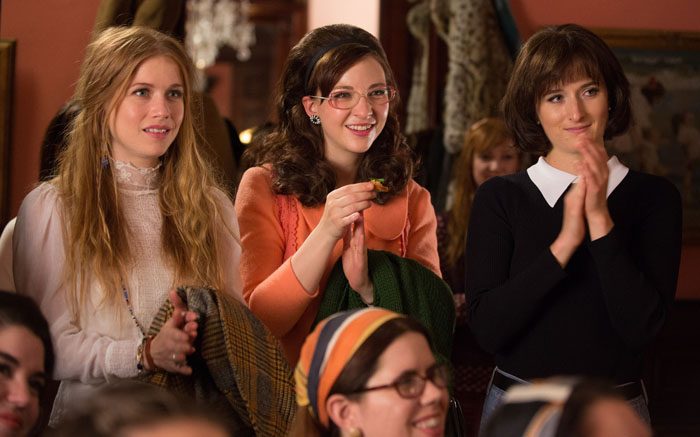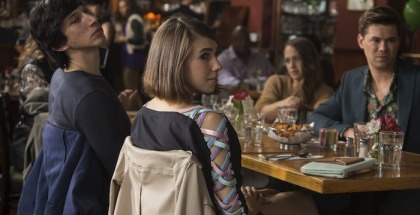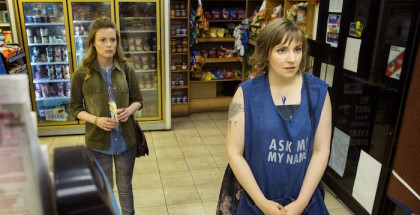Amazon UK TV review: Good Girls Revolt
Review Overview
Slow-burn appeal
8Groovy set design / costumes
8Revolutionary spirit
7Helen Archer | On 28, Oct 2016
It is simultaneously completely apt and completely unfair to compare Amazon’s Good Girls Revolt to its obvious stable-mate, AMC’s Mad Men. In addition to obvious likenesses – both are workplace period dramas – they also deal with similar themes – generational clashes, an increasing modernisation of both the personal and the political, and, of course, the uprising of the feminist consciousness. Yet while Mad Men’s women were, for the most part, secondary characters to the males, Good Girls Revolt, created by Dana Calvo, puts them front and centre, and it is their inner radicalisation on which the show concentrates.
The series begins at the cusp of a new decade, as the 60s turn to the 70s, and is based around the true story of Newsweek (here changed to the fictional News of the Week) versus the Equal Employment Opportunity Commission, who charged the magazine with systemic gender discrimination, after scores of its female staffers came forward to complain about the magazine’s work practices. It was a landmark case, spurring many other female employees of contemporary news outlets to do the same – and it proves to be fertile subject ground for drama.
We join News of the Week in 1969, in the lead-up to the official complaint. The look of the newsroom here is very different to the offices of Sterling Cooper, and points towards the ways in which the times are a-changing. While Mad Men had a style reminiscent of Douglas Sirk, Good Girls Revolt is altogether more Robert Altman. A fug of cigarette smoke lingers above the brown, slightly washed-out office, battling the smell of the mimeograph, which rumbles away beyond the clattering of the typewriter keyboards. The dresses are garishly patterned, the boots are knee-high, the glasses thick-framed, and cocktail rings and long beads carelessly adorn casually draped outfits. Everything is grittier and less formal than the famous ad agency, although the Donald Draper suits still clothe the traditional establishment editors, while the Jackie Kennedy pillbox hats are worn by the ageing southern belle heiress proprietor.
The women researchers work in what is described as “the pit” – literally a lower level within the newsroom, while the males sit around them on raised desks. Only men are accredited writers, reporters and editors, although, in many cases, the women are far more qualified than their male ‘superiors’, and are researching and often writing the entire pieces, their work appearing in print with the male staffers’ bylines.
We are introduced to the researchers as they attend a female consciousness-raising meeting in a New York apartment, attended by the ACLU’s Eleanor Holmes Norton (here played by Joy Bryant) and Nora Ephron (Grace Gummer), where the women are urged to explore not only their own bodies, but also their own marriages, familial relationships and workplaces, and to acknowledge the truth of their experiences. It’s here that the seed of suing for unfair workplace practices is sown, as Holmes Norton advises the women in attendance that the magazine is violating the Civil Rights Act.
But the series takes its time in getting to the meat of the legal case, as we slowly get to know the ‘good girls’ of the cast – who are all ‘good’ in their own, very different, ways. So we have the good daughter, Jane (the ever-perky and likeable Anna Camp), a privileged daddy’s girl, whose mother, an eating-disorder enabler, feeds her amphetamines in order to curb her appetite. Erin Darke plays Cindy, the good wife, stuck in a passionless and unfulfilling marriage, whose only salvation is her work at the magazine. The several good mothers keep quiet about the children they have at home. Meanwhile, the main character, and instigator of the civil rights complaint, Patti (Genevieve Angelson), is dumped by her boyfriend and co-worker Douglas (Weeds star Hunter Parrish) for being too ‘complicated’ – expressly, for her refusal to conform to the traditional relationship roles. Hip to the counter-culture going on around them, Patti is trying to stir things up at work by reporting on issues in a fresh way, and giving voice to people who haven’t yet had one. (She’d be written off as a social justice warrior today.)
The male characters don’t get as much screentime, and are cast as foils for the females. While we have the Donald Draper figure in boss Finn (Chris Diamantopoulos) – whose marriage is falling apart due to his workaholism – his story is the least interesting. Photographer Ned (Michael Oberholtzer) helps along Cindy’s sexual awakening, while new guy Gabriel (Teddy Bergman) awkwardly harasses his researcher, and Jane’s work partner, Sam (Daniel Eric Gold), takes revenge for imagined romantic slights, by putting her to work far below her ability. Jim Belushi is pitch perfect as Wick, representing the staid old guard editorial chief, fighting a losing battle against inevitable progress and the ongoing search for a younger readership.
The time period and the news setting is ripe for fascinating topics. The Black Panthers have replaced the Russians on the FBI’s radar, and are the new public enemy number 1, and the discussions about systemic racism and police brutality are depressingly contemporary. Vietnam, too, is an ever-present shadow lurking in the background. While the more traditional newsmen want to stick with safer scoops, there is pressure from all sides to open up to the new culture that surrounds them, to broaden their scope and their minds to account for it in the magazine, and the stories get more politically interesting as series progresses.
This is a show ripe with possibility and strangely current, as age-old power structures are questioned and challenged. Its general underlying theme – of personal and political liberation – is eternal, and the show tackles it fearlessly. It’s less stylised and more informal than Mad Men, which, along with its subject matter, doubtless means it will be written off as soapy – a shorthand for something dealing with predominately female concerns. But there is an undeniable edge to the series which cuts through such criticisms, and it’s a well-observed insight into a period which left a legacy of powerful and enduring feminist ideals.
All episodes of Good Girls Revolt are now available exclusively on Amazon Prime Video, as part of a £5.99 monthly subscription – or, if you want next-day delivery on Amazon products too, as part of a £79 annual Amazon Prime membership.



















